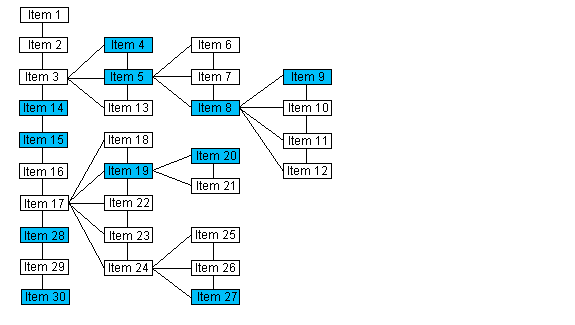- iod
- An item in the IOD Structure.
- tree
- true to evaluate the IOD Structure as a tree, false to evaluate the IOD Structure as a list.
| Visual Basic (Declaration) | |
|---|---|
Public Function GetNext( _ ByVal iod As DicomIod, _ ByVal tree As Boolean _ ) As DicomIod | |
| Visual Basic (Usage) |  Copy Code Copy Code |
|---|---|
| |
Parameters
- iod
- An item in the IOD Structure.
- tree
- true to evaluate the IOD Structure as a tree, false to evaluate the IOD Structure as a list.
Return Value
DicomIod class that contains the item in the IOD Structure that immediately follows the item specified in iod.For an example, refer to DicomIodTable.Reset.
If the IOD Structure is evaluated as a tree structure, this method returns the next item on the same level as iod with the same parent as iod. Please note that the numbering of the items in this illustration is arbitrary and does not imply order. 
If the IOD Structure is evaluated as a list, the previous item in the list is returned. Please note that the numbering of the items in this illustration does indicate the order of the items when the IOD Structure is evaluated as a list.If the passed class is : The method returns: Item 1 Item 2 Item 3 Item 4 Item 5 null Item 6 Item 7 
The following methods will also help you navigate the IOD Structure as either a tree or a list:If the passed class is : The method returns: Item 14 Item 15 Item 4 Item 5 Item 8 Item 9 Item 19 Item 20 Item 27 item 28 Item 30 null
If you evaluate the IOD Structure as a tree, you can also use the following methods to navigate the tree:
Target Platforms: Microsoft .NET Framework 3.0, Windows XP, Windows Server 2003 family, Windows Server 2008 family

